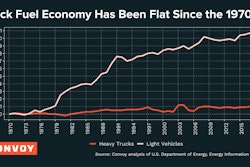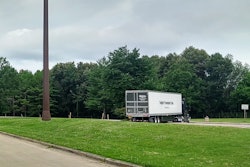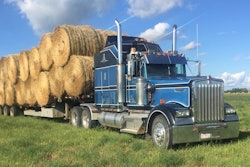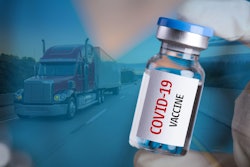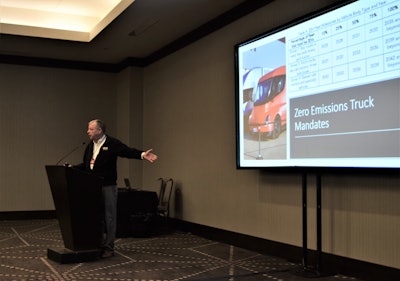
Joe Rajkovacz of the Western States Trucking Association, pictured above, shared what he feels is the likely ultimate direction of California Air Resources Board regulators as regards future requirements in the state for adoption of zero-emission vehicles (ZEVs) by commercial carriers.
"CARB is finalizing rules to require people to convert from diesel to electric trucks," Rajkovacz said, making reference to CARB's "Advanced Clean Fleets" initiative in process. The chart in the picture above, which Rajkovacz noted was part of a recent CARB presentation, shows the following potential requirement for fleets to phase in ZEVs as part of their power-unit mix.
Rajkovacz worries over the reality that among trucking constituencies, particularly among small fleets and owner-operators, "a lot of fatigue with environmental regs" could serve to tamp down engagement with CARB when it comes to electric vehicle regs, he said. "Not a lot of people are participating in the process" to date.

Regular readers will recall the last big round of emissions restrictions on in-use equipment in the state -- CARB's Statewide Truck & Bus Rule, which today has resulted in most pre-2010 model year engines essentially outlawed on the state's roads, with limited exceptions for truckers who haul very seldom in the state and some allowance for 2007-'09 trucks. Rajkovacz noted "we've got members to this day who are moving divisions out of state to continue to operate 2007-09 trucks," the first model years to feature diesel particulate filters as part of the emissions package. Such equipment owners are anticipating the January 1, 2023, deadline for those engines to be retired or swapped with 2010-emissions-spec rigs.
According to Rajkovacz, the ZEV timeline targets for sleeper tractors that CARB has presented, as he understands them -- they haven't been officially "proposed," exactly, yet, he said -- would work in a similar fashion. Owners would be required to register with and report to CARB the fleet composition, meeting those targets, if these targets are adopted as a mandate on in-use vehicles.
Minus considerable uptick in industry objection, Rajkovacz feels, the new generation of regulators within CARB is unlikely to veer too far from the path, despite past regulators' good memories of the upheaval the Truck & Bus Rule brought to the state's trucking industry -- with national implications, too. "A whole new generation of regulators in there haven’t eaten from that sandwich," he said, and CARB appears to be on the same path with ZEVs. "They’re doing it again." He feels there's a real sense of "inevitability of this happening," and "what tends to flow out of California tends to at some point affect everybody."
Interestingly, too, brokers might also be included in such a mandate to ensure their freight-movement service providers are at percentage levels shown, Rajkovacz said.
The biggest worry he has in this timeline is cost, in the end. "I happen to be fascinated by [the potential for] fuel-cell electric trucks," Rajkovacz said. "We have 100% hydrogen fuel cell-powered cars" today. "It's fascinating technology, but it’s costly."
Rajkovacz shared an anecdote from a WSTA member fleet participating in an electric-truck demonstration project, supported by grants. That trucking company shared with Rajkovacz paperwork showing the rig's price tag, minus federal excise tax, at well upward of $500K. He asked the several hundred thousand-dollar question: "Where’s the cost going to finally come down to 15 years from now when everybody’s producing these?"
WSTA recently filed these comments with CARB related to its Advanced Clean Fleets initiative. Find more about the ACF via this link.
[Related: Don't let the push toward electric powertrains turn into a 'green monopoly']

